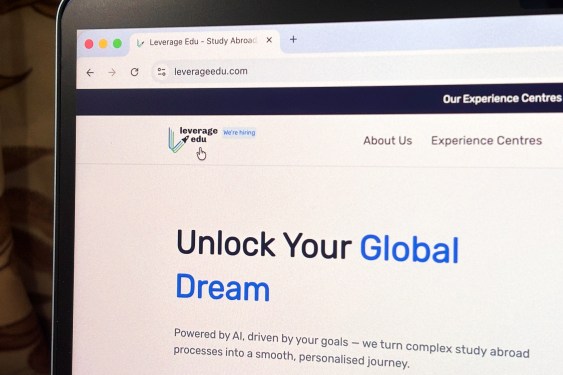As visa crackdowns and diplomatic tensions block traditional study abroad routes, an Indian company called Leverage Edu is helping students reroute their dreams. Students are shifting from Canada to Germany, and from India to Nigeria and Saudi Arabia. This agility is paying off for the startup, which has doubled its revenue, turned profitable, and is now expanding its global footprint.
Over the past several months, students across emerging markets have faced growing uncertainty around international college admissions. Shifting visa rules and diplomatic tensions have disrupted application timelines and eligibility for thousands. These tensions include the standoff between India and Canada and new strains in India-US ties over tariffs and immigration policy. Countries such as Canada and Australia have introduced stricter student visa policies, catching many families off guard. Even long-standing local consultants and study abroad firms have struggled to adapt.
Leverage Edu has responded by helping students identify alternative destinations and adjust quickly, keeping their plans on track despite the disruption. The eight-year-old startup was quick to respond when India-Canada relations soured. It helped Indian students reroute to Germany and assisted Canadian universities in recruiting from Nigeria, effectively salvaging student pipelines in both regions. It is now applying that same strategy amid ongoing US-India strains.
While the company continues to send students to the US, a growing share of that demand now comes from countries like Brazil and Vietnam, where interest in US universities remains strong. That ability to shift quickly across geographies is central to its growth strategy. In the last two months, the startup has expanded into Saudi Arabia, Egypt, Vietnam, and Malaysia. These are emerging markets with growing numbers of students seeking to study abroad but with limited access to structured admissions support. With this push, Leverage Edu now operates in 16 countries where it recruits students, helping them apply to universities across 11 destination countries.
Beyond applications, the startup is positioning itself as a full-service platform for international education, helping students plan, finance, and manage their journeys. Its tools include a mobile app, an AI-powered course search engine, a university matchmaking tool called UniConnect, and a newly launched software suite for global universities under the brand Univalley.ai. The startup has also expanded into adjacent categories, with offerings like Leverage MBBS for medical aspirants, as well as Fly Finance for education loans, Fly Homes for student housing, and other services.
Leverage Edu now places over 10,000 students annually, up from around 1,500 just a few years ago. Much of that growth has come through organic demand, with sixty percent of student acquisitions requiring zero customer acquisition cost.
Financially, the startup has seen sharp growth and turned profitable for the first time this year, a rarity in India’s education technology sector. It closed fiscal year 2025 with over 1.8 billion rupees in revenue, doubling from the previous year’s 900 million rupees. Between April and September, the first half of fiscal year 2026, it generated more than 2 billion rupees, and is on track to end the fiscal year with 3.7 to 3.8 billion rupees in revenue.
On the profitability front, Leverage Edu garnered 120 to 130 million rupees in profit after tax, and expects to surpass 250 million rupees by the end of fiscal year 2026. This marks a significant turnaround from a full-year loss of 800 million rupees in fiscal year 2025.
The startup generates around twenty-five percent of its revenue from its platform businesses, which support students beyond admissions with value-added services including loans, money remittance, housing, and assistance with securing internships or first jobs. The remaining seventy-five percent of revenue comes from its core education business, which is student placement and counseling services. Within that, about twenty percent comes directly from students and fifty-five percent from universities in commissions.
India remains the company’s largest source market, accounting for fifty-eight percent of its total student base. Within the country, the startup focuses on states like Andhra Pradesh, Kerala, and Punjab, regions that consistently send large numbers of students to universities abroad.
In terms of destinations, the United Kingdom remains its largest market, accounting for fifty-two percent of student placements, followed by Germany at twenty-two percent. Italy, its fastest-growing market this summer, is also gaining traction. North America currently represents less than five percent of total placements, reflecting tightened visa rules and diplomatic headwinds in recent years. The startup expects this share to grow as its presence expands across Latin America, Southeast Asia, and the Middle East.
With rising revenues and an expanding global footprint, the startup is now weighing a potential initial public offering in India as early as next year. Investment bankers have already made early pitches. The founder and CEO did not deny the possibility of a public listing, but said the company would decide between pursuing an IPO or raising external capital after hitting the one hundred million dollar revenue milestone, which it expects to reach sometime in 2026.
So far, Leverage Edu has raised less than fifty million dollars in equity. The company operates across 27 countries through over 50 offices and has a headcount of around 800 people.

